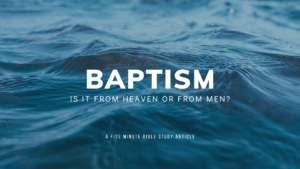Men and women who stand by their convictions are hard to come by. They always have been. But history is full of individuals who remind and motivate me to be just that: convicted and resolved. One such individual is a lesser known preacher from the Restoration Movement of the 1800’s by the name of Tolbert Fanning. I was introduced to this name a few years ago and finally read a biography about the Nashville preacher this past year. There were several stories throughout the book that grabbed my attention. Early in his preaching career Fanning went to a tent meeting, and his opening line was to throw the mourner’s bench down a nearby hill indicating that such a thing had no scriptural support. Several people told Fanning when he was a young man starting out to preach that he would never make it as a preacher; he didn’t have the skill set they told him. But he would prove them wrong by upstarting and operating Franklin College near Nashville, Tennessee and instructing one of the most well known figures of the Restoration Movement– David Lipscomb. But the thing that impressed me the most and won my admiration was his fortitude during the Civil War.
As the South’s secession from the Union became imminent, many preachers within the church of Christ ranks debated over the Christian’s relationship and duty toward the Southern cause and warfare altogether. Fanning was outspoken against the Christian’s involvement in civil affairs and most especially the taking of someone else’s life. Because of his beliefs, Fanning was ostracized by his brothers in Christ and both the Southern and Northern armies as Nashville became a headquarters for both sides through the conflict. He refused to take sides and bear arms, and he paid for it dearly. Despite the ridicule, harm, and hate poured out on him, Fanning would not abandon his deepest convictions.
“Because of Fanning’s position in regard to Christians participating in war, many of his own brethren accused him of disloyalty to the government. Fanny was encouraged that the Presidents of both North and South respected his position as far as possible for men in their positions. But he continually had difficulty from religious bigots. Even some of his own preaching brethren sneered at him for his ‘unsoundness.’ Others in the church told him that unless they repudiated him the church would not be respected by the rest of the world.
When the Union troops marched into Nashville and made that a base of operations for the greater part of the war, they demanded that its citizens swear allegiance to the northern cause. Fanning tried to explain to them that he would not swear with the oath although he had been loyal to four governments–the United States, Britain, the Southern Confederacy, and now the Northern Military power. But they still classed him as disloyal. As a result, although he was not placed in prison, all of his possessions were burned, and he was personally treated as an outlaw. Few men suffered more during the war. Because he was convicted of treason, he was not paid for honest work that he performed, and there were periods when he went for weeks at a time without bread in his house. Renegade bands of men roamed the countryside during the war, and many of Fanning’s neighbors were robbed. In several cases, whole families were murdered in cold blood. ‘We frequently saw openings to lose our life,’ he recalled, ‘and have our families outraged by miscreants, had we resorted to violent resistance. Many of our intimate acquaintances lost their lives by physical resistance.’ The agony of these memories was compounded when, after the war, Isaac Errett accused him of thinking up his anti-war convictions because of his disappointment in the ‘lost cause.'”*
I do not share this about Tolbert Fanning advocating for his sainthood. I share this as a reminder for boldness and conviction to myself and all who will read. There are moments when I do not share the convictions of my heart. It may feel like a lost cause that suppresses my voice, or it may be the intimidation of the masses in the moment. Now’a’days the worry of offending someone becomes so daunting that truth is never spoken. I need the example of the Tolbert Fannings and William Tyndales of history. We need not be weird for the sake of weirdness like the guy who parades the spike through his nose cartilage. But we need not put a leash on the truth of God for fear of being weird or all alone either. Peter reminded suffering Christians not to think it strange when others ridiculed and ostracized them (1 Peter 4:12). This is inevitable for the Christian that plants his feet in a light surrounded by darkness. May this example of a brave Christian motivate you to stand for the truth no matter the cost, always doing so with a spirit of meekness and love.
*James Wilburn, The Hazard of the Die, (Austin: Sweet Publishing Co., 1969), 219-220. This quotation was granted by the permission of Sweet Publishing Company on August 11, 2020.



